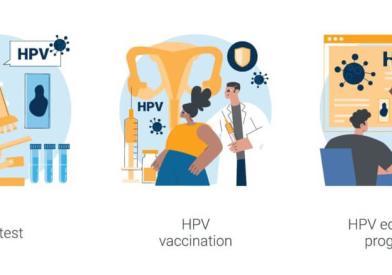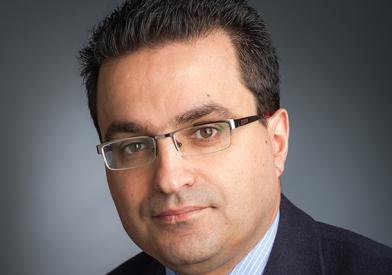Our Mission
The role of Dana-Farber's Community Health is to support the Institute's mission to reduce cancer risk among medically underserved populations. We advance the Institute's mission by reaching beyond our walls to support diverse communities with a continuum of our expert, compassionate, and equitable care. Our work is grounded in equity and social justice.
To achieve our mission, Community Health applies a health equity lens to:
- Expand access to our measurable, evidence-based programs in early detection, screening, and cancer prevention and education — to reach at-risk, historically marginalized, and diverse populations.
- Partner with community health centers, community-based organizations, and government entities to assess, enhance, and improve the overall health and well-being of the members of our communities.
Improving the Health of Our Communities
We work with city and state health departments, community partners, and Boston-based coalitions to assess and monitor the needs of local residents with respect to cancer management. We aim to serve as a bridge between evidence-based and sustainable outreach programs, and community organizations.
Community Health Needs Assessment Reporting
Dana-Farber's Community Health Office also engages in a number of comprehensive reporting processes in collaboration with local, state, and federal health agencies and other community-based partners to satisfy applicable regulatory requirements and demonstrate measurable outcomes in reducing the cancer burden in our priority neighborhoods.
Determination of Need Community Health Initiative Funding
Dana-Farber has released the first round of funding for its Request for Proposals (RFP) funding opportunity aimed at ensuring all residents, particularly those impacted by cancer and other chronic conditions, have access to coordinated and equitable health and support services. Through this funding opportunity, up to $4 million will be awarded to community organizations in Greater Boston between 2021 and 2025 to support initiatives that address root causes of health inequities and support needs across the cancer spectrum.
Early Detection, Screening, Cancer Prevention and Education
Our office is on the front lines of supporting and collaborating on programs designed to eliminate disparities in breast, colon, and skin cancer; educate diverse populations about tobacco cessation, human papillomavirus (HPV) prevention and screening; and strengthen the support system for medically underserved populations. In short, we care committed to making Dana-Farber's care and research findings more accessible to everyone within and outside our walls.
AssessYourRisk Tool
AssessYourRisk is a free online cancer education tool designed for all persons at risk of breast or ovarian cancer. By using a brief, 5-10-minute quiz/evaluation, you receive personalized recommendations and resources to help you manage or reduce your risk of cancer in the future. This tool and its accompanying resources are designed to serve members of our diverse community who can benefit from early detection to help them reduce their overall cancer risk.
Cancer Care Equity Program
Led by Christopher Lathan, MD, MS, MPH, Faculty Director for Cancer Care Equity, the Cancer Care Equity Program (CCEP) at Dana-Farber Cancer Institute bridges research and outreach efforts to address cancer disparities. Through a variety of efforts, including a clinical outreach program at Whittier Street Health Center in Roxbury, health equity reporting, and support for cancer disparities research, among others, CCEP aims to broaden access to vulnerable patient populations and join our community partners in the quest for equitable care across the spectrum of cancer-related disease.
Community Outreach and Education Program
Our Community Outreach and Education team partners with local organizations to provide cancer prevention education to historically marginalized populations in Greater Boston. Our evidence-based, culturally-tailored curriculum is designed to inform diverse communities on cancer screening recommendations, cancer disparities, and available resources. We also partner with our expert faculty and survivors to bring cancer-specific education directly to the community. Our bilingual Community Outreach Specialists are able to present in English, Spanish, Cantonese, and Mandarin.
HPV-Related Cancer Outreach Program
Dana-Farber's HPV-Related Cancer Outreach Program uses a multi-pronged approach to prevent six types of cancer caused by the human papillomavirus (HPV). HPV-related cancers can be prevented with vaccination, screening, and early detection.
Mammography Van
The only mobile digital mammography program in the Commonwealth of Massachusetts, Dana-Farber's Mammography Van provides screening mammograms and breast health education to women 40 years of age and older.
Mammography Suite at Whittier Street Health Center
A Dana-Farber cancer care team at the Mammography Suite at Whittier Street Health Center — including board-certified mammography technologists, program coordinators, and breast health educators — connects low-income, elderly, and medically underserved women to high-quality care screening for breast cancer.
Sun Safety/Skin Cancer Prevention Program
Dana-Farber's Sun Safety/Skin Cancer Prevention Program works to reduce the incidence of skin cancer in Massachusetts through free education and free skin screenings for the public.
Tobacco Treatment Program at Whittier
Tobacco use is the number one risk factor for lung cancer. In the United States, tobacco use is linked to about 90 percent of lung cancer deaths, according to the Centers for Disease Control and Prevention. As part of our comprehensive approach to reduce smoking and tobacco-related cancers, Dana-Farber provides tobacco cessation counseling to Whittier Street Health Center patients.












